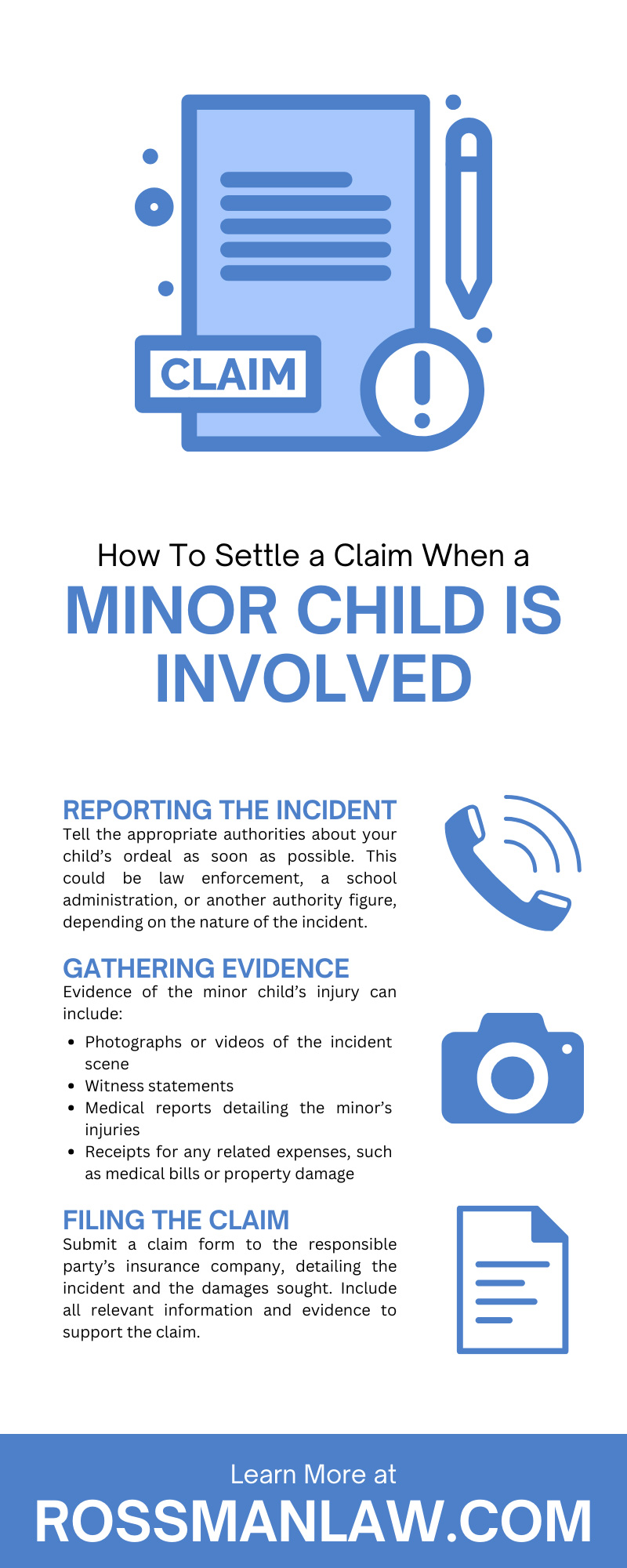
What To Expect During a Personal Injury Lawsuit
March 11, 2024
Does Verbal Assault Count As Personal Injury?
March 22, 2024When it comes to navigating the legal system, few things can be as daunting as settling a claim involving a minor child. Whether it’s an injury at school, a car accident, or an incident at a public place, such situations are fraught with overlapping emotions.
As a parent or guardian, your primary concern is always the welfare and well-being of your children. But when they become entwined in legal matters, you must understand not only how to protect them but how to ensure their rights are upheld and their interests safeguarded.
Let’s delve into how the claims process works when it involves minor children. By understanding the process more fully, you’ll be better equipped to navigate the legal system and advocate effectively for the minor involved.
Legal Rights and Responsibilities
When a minor child is involved in an incident that leads to a claim, you play a crucial role in the proceedings. You’re not just a caregiver—you’re an advocate for the child’s best interests.
Your Responsibilities
As a guardian, you are expected to act in the child’s best interest at all times. This includes making decisions about whether or not to pursue a claim, what type of compensation to seek, and how to handle negotiations. You are also responsible for communicating with attorneys, insurance companies, and the court on behalf of the minor.
Remember:
While you may be the one making these decisions and having these conversations, the claim ultimately belongs to the minor, and any settlement received is their property.
The Minor’s Rights
Minor children have the same basic legal rights as adults when it comes to personal injury claims. They have the right to seek compensation for medical bills, pain and suffering, and other damages. However, there are some significant differences in how these rights are exercised due to their age and legal status.
First, minors cannot file a lawsuit or negotiate a settlement themselves. This is where you, as a guardian, step in to act on their behalf.
In addition, a settlement involving a minor often requires court approval to ensure the child’s best interests are being served. This is a protective measure to prevent misuse of the minor’s settlement funds.
The statute of limitations for personal injury claims is usually extended for minors. Adults typically have a set amount of time from the date of the incident to file a claim. However, the clock for minors doesn’t start ticking until they reach the age of majority.
The Role of an Attorney
Navigating the legal maze becomes significantly easier when you have a seasoned attorney by your side, especially when a minor child is involved. An attorney’s role extends far beyond providing legal advice; they serve as your guide, your negotiator, and most importantly, your advocate throughout this complex process.
An expert like a hospital negligence attorney brings to the table a wealth of knowledge and experience that can be invaluable in these situations. They understand the intricacies of the law, particularly as it pertains to minors, and are adept at clarifying legal jargon in a way that laypeople can easily understand. This understanding empowers you, as a guardian, to make informed decisions that best serve the interests of the child.
Steps for Settling a Claim
The claims settlement process has several facets—each crucial in its own right—to ensure that the child’s best interests are upheld and a fair settlement is reached.
Reporting the Incident
Tell the appropriate authorities about your child’s ordeal as soon as possible. This could be law enforcement, a school administration, or another authority figure, depending on the nature of the incident. Reporting is crucial because it creates an official record of the event, which can be instrumental in supporting the claim later on.
Gathering Evidence
Evidence of the minor child’s injury can include:
- Photographs or videos of the incident scene
- Witness statements
- Medical reports detailing the minor’s injuries
- Receipts for any related expenses, such as medical bills or property damage
The more comprehensive and detailed your evidence, the stronger your case will be.
Filing the Claim
Submit a claim form to the responsible party’s insurance company, detailing the incident and the damages sought. Include all relevant information and evidence to support the claim. At this stage, having an attorney to guide you through the intricacies of the claim filing process is immensely beneficial.
Negotiating the Settlement
This step is where an experienced attorney can truly make a difference. They can negotiate assertively with the insurance company, using their understanding of the law and the evidence gathered to advocate for a settlement that adequately compensates the minor.
Gaining Court Approval
In cases involving minors, settlements often require court approval to ensure that said settlement is in the minor’s best interest. An attorney can guide you through this process, helping you prepare the necessary documents and presenting the case to the court. The court will review the settlement and, if it deems it fair and in the minor’s best interest, will grant approval.
Potential Obstacles
Settling a claim involving a minor can present unique challenges. But when you know how to navigate them, you can greatly increase the chances of a successful resolution.
Gathering Sufficient Evidence
You’ll need every scrap of evidence possible to bolster your claim, from medical records to eyewitness testimonies. Getting enough evidence together requires diligence and thoroughness so nothing slips through the cracks. Be sure to keep detailed records of everything related to the incident.
Dealing With Insurance Companies
The defendant’s insurance company may attempt to deny the claim or offer a settlement that is far below what the minor deserves. Engaging an attorney is crucial in this scenario. They can negotiate assertively on your behalf, countering any lowball offers and advocating for a fair settlement.
Obtaining Court Approval
Getting the court to approve the child’s settlement can be a substantial obstacle. The court’s role is to ensure that the terms of the settlement serve the best interests of the minor. Work with your attorney to prepare a compelling case that clearly demonstrates how the settlement terms meet the child’s needs.
Now What?
While settling a claim when a minor child is involved can be complicated, it’s also an opportunity to safeguard the child’s future well-being. The settlement they receive can provide much-needed financial resources for the child’s medical care, education, and other requirements as they grow.
Every step you take, from hiring the right attorney to negotiating with insurance companies, should be guided by the principle of safeguarding your child’s best interests. It’s not just about seeking compensation; it’s about securing a safer, brighter future for your child after a traumatic incident.






